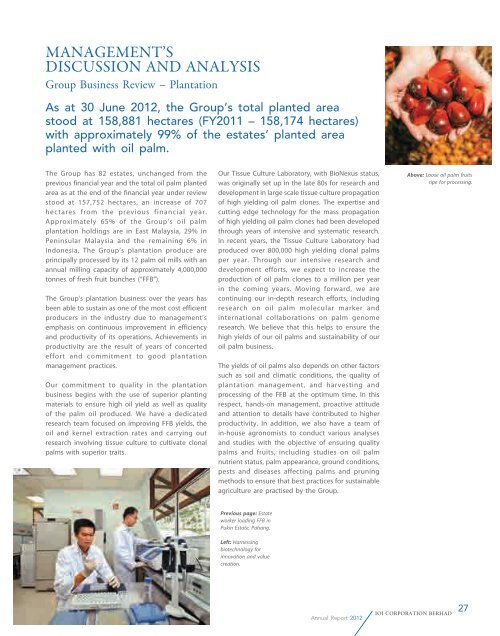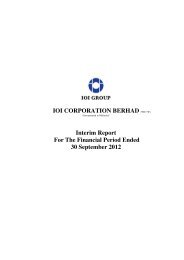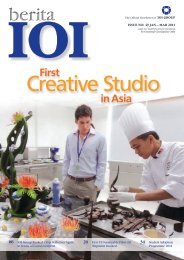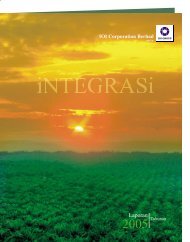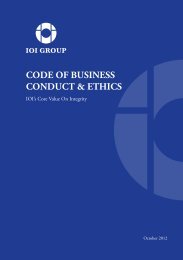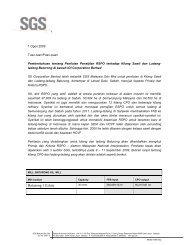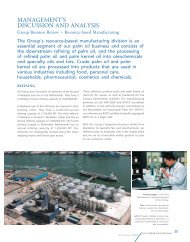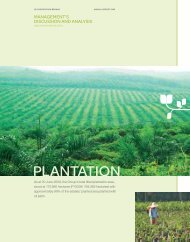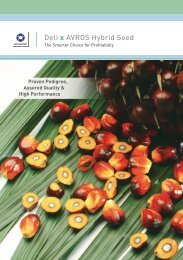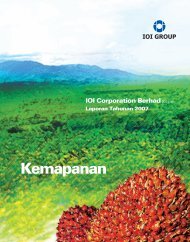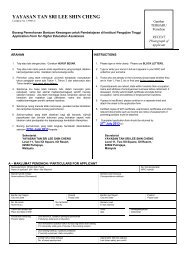Annual Report 2012 - IOI Group
Annual Report 2012 - IOI Group
Annual Report 2012 - IOI Group
You also want an ePaper? Increase the reach of your titles
YUMPU automatically turns print PDFs into web optimized ePapers that Google loves.
MANAGEMENT’SDISCUSSION AND ANALYSIS<strong>Group</strong> Business Review – PlantationAs at 30 June <strong>2012</strong>, the <strong>Group</strong>’s total planted areastood at 158,881 hectares (FY2011 – 158,174 hectares)with approximately 99% of the estates’ planted areaplanted with oil palm.The <strong>Group</strong> has 82 estates, unchanged from theprevious financial year and the total oil palm plantedarea as at the end of the financial year under reviewstood at 157,752 hectares, an increase of 707hectares from the previous financial year.Approximately 65% of the <strong>Group</strong>’s oil palmplantation holdings are in East Malaysia, 29% inPeninsular Malaysia and the remaining 6% inIndonesia. The <strong>Group</strong>’s plantation produce areprincipally processed by its 12 palm oil mills with anannual milling capacity of approximately 4,000,000tonnes of fresh fruit bunches (“FFB”).The <strong>Group</strong>’s plantation business over the years hasbeen able to sustain as one of the most cost efficientproducers in the industry due to management’semphasis on continuous improvement in efficiencyand productivity of its operations. Achievements inproductivity are the result of years of concertedeffort and commitment to good plantationmanagement practices.Our commitment to quality in the plantationbusiness begins with the use of superior plantingmaterials to ensure high oil yield as well as qualityof the palm oil produced. We have a dedicatedresearch team focused on improving FFB yields, theoil and kernel extraction rates and carrying outresearch involving tissue culture to cultivate clonalpalms with superior traits.Our Tissue Culture Laboratory, with BioNexus status,was originally set up in the late 80s for research anddevelopment in large scale tissue culture propagationof high yielding oil palm clones. The expertise andcutting edge technology for the mass propagationof high yielding oil palm clones had been developedthrough years of intensive and systematic research.In recent years, the Tissue Culture Laboratory hadproduced over 800,000 high yielding clonal palmsper year. Through our intensive research anddevelopment efforts, we expect to increase theproduction of oil palm clones to a million per yearin the coming years. Moving forward, we arecontinuing our in-depth research efforts, includingresearch on oil palm molecular marker andinternational collaborations on palm genomeresearch. We believe that this helps to ensure thehigh yields of our oil palms and sustainability of ouroil palm business.The yields of oil palms also depends on other factorssuch as soil and climatic conditions, the quality ofplantation management, and harvesting andprocessing of the FFB at the optimum time. In thisrespect, hands-on management, proactive attitudeand attention to details have contributed to higherproductivity. In addition, we also have a team ofin-house agronomists to conduct various analysesand studies with the objective of ensuring qualitypalms and fruits, including studies on oil palmnutrient status, palm appearance, ground conditions,pests and diseases affecting palms and pruningmethods to ensure that best practices for sustainableagriculture are practised by the <strong>Group</strong>.Above: Loose oil palm fruitsripe for processing.Previous page: Estateworker loading FFB inPukin Estate, Pahang.Left: Harnessingbiotechnology forinnovation and valuecreation.<strong>Annual</strong> <strong>Report</strong> <strong>2012</strong><strong>IOI</strong> CORPORATION BERHAD 27


